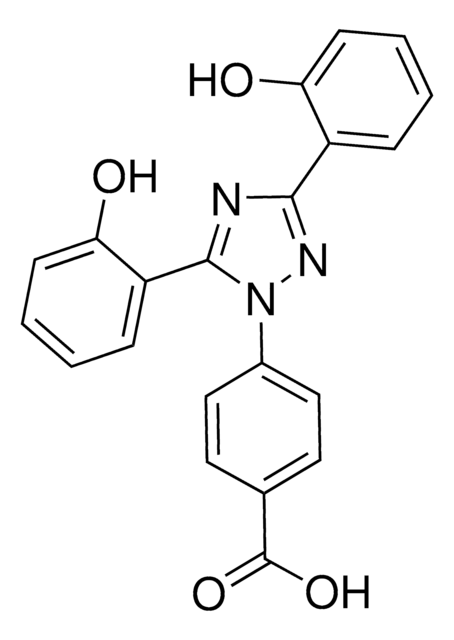379409
3-Hydroxy-1,2-dimethyl-4(1H)-pyridone
98%
Synonym(s):
Deferiprone
Sign Into View Organizational & Contract Pricing
All Photos(1)
About This Item
Empirical Formula (Hill Notation):
C7H9NO2
CAS Number:
Molecular Weight:
139.15
MDL number:
UNSPSC Code:
12352100
PubChem Substance ID:
NACRES:
NA.22
Recommended Products
Assay
98%
form
powder
mp
272-275 °C (lit.)
SMILES string
CN1C=CC(=O)C(O)=C1C
InChI
1S/C7H9NO2/c1-5-7(10)6(9)3-4-8(5)2/h3-4,10H,1-2H3
InChI key
TZXKOCQBRNJULO-UHFFFAOYSA-N
Looking for similar products? Visit Product Comparison Guide
General description
3-Hydroxy-1,2-dimethyl-4(1H)-pyridone (Hdpp, Deferiprone) is a hydroxy ketone derivative. It reacts with uranyl salts [UO2(NO3)2] in aqueous acidic solution to afford mono nuclear complexes ([UO2(dpp)(Hdpp)2(H2O)]ClO4). X-ray studies have been conducted to examine the structure and geometry of these complexes.
Application
3-Hydroxy-1,2-dimethyl-4(1H)-pyridone (OH-pyridone) may be used in the bacterial killing assays. It has been employed as hydroxyketone chelating agent and its cytotoxic action against oral human normal and tumor cell lines has been evaluated.
Signal Word
Warning
Hazard Statements
Precautionary Statements
Hazard Classifications
Acute Tox. 4 Oral
Storage Class Code
11 - Combustible Solids
WGK
WGK 3
Flash Point(F)
Not applicable
Flash Point(C)
Not applicable
Personal Protective Equipment
dust mask type N95 (US), Eyeshields, Gloves
Certificates of Analysis (COA)
Search for Certificates of Analysis (COA) by entering the products Lot/Batch Number. Lot and Batch Numbers can be found on a product’s label following the words ‘Lot’ or ‘Batch’.
Already Own This Product?
Find documentation for the products that you have recently purchased in the Document Library.
Customers Also Viewed
Etheresia Pretorius et al.
Toxicology mechanisms and methods, 23(5), 352-359 (2013-01-03)
Inflammatory diseases associated with iron overload are characterized by a changed coagulation profile, where there is a persistent presence of fibrin-like material of dense-matted deposits (DMDs). It is believed that one source of such material is a result of the
Chryssoula Drouza et al.
Inorganic chemistry, 43(26), 8336-8345 (2004-12-21)
Reaction of [UO(2)(NO(3))(2)] with the hydroxy ketones 3-hydroxy-2-methyl-4-pyrone (Hma) and 3-hydroxy-1,2-dimethyl-4(1H)-pyridone (Hdpp) in aqueous acidic solutions (pH approximately 3) yields the compounds [UO(2)(ma)(2)(H(2)O)].H(2)O (1.H(2)O) and [UO(2)(dpp)(Hdpp)(2)(H(2)O)]ClO(4) (2), respectively. X-ray diffraction shows that the geometry around the metal ion in both
Jaroslav Cermak et al.
Leukemia research, 37(12), 1612-1615 (2013-08-14)
One hundred thirteen patients with myelodysplastic syndromes (MDS) with <10% of bone marrow blasts received either deferiprone in a daily dose of 40-90 mg/kg (48 patients) or deferasirox in a daily dose of 10-40 mg/kg (65 patients). Median duration of
Raffaella Origa et al.
British journal of haematology, 163(3), 400-403 (2013-09-17)
This study aimed to verify the impact of heart magnetic resonance imaging on chelation choices and patient compliance in a single-institution cohort as well as its predictive value for heart failure and arrhythmias. Abnormal cardiac T2* values determined changes in
Carole Peyssonnaux et al.
The Journal of clinical investigation, 115(7), 1806-1815 (2005-07-12)
Hypoxia is a characteristic feature of the tissue microenvironment during bacterial infection. Here we report on our use of conditional gene targeting to examine the contribution of hypoxia-inducible factor 1, alpha subunit (HIF-1alpha) to myeloid cell innate immune function. HIF-1alpha
Our team of scientists has experience in all areas of research including Life Science, Material Science, Chemical Synthesis, Chromatography, Analytical and many others.
Contact Technical Service






![Sodium tetrakis[3,5-bis(trifluoromethyl)phenyl]borate](/deepweb/assets/sigmaaldrich/product/structures/251/439/7a621e74-bfd1-4a43-833c-09adfcc1e0b3/640/7a621e74-bfd1-4a43-833c-09adfcc1e0b3.png)






